Maintaining proper hydration and electrolyte balance is critical for individuals engaged in sports and exercise. Electrolytes, such as sodium, potassium, and magnesium, play a significant role in regulating bodily functions—especially during physical activities. They help with nerve signaling, muscle contractions, and maintaining fluid balance.
When we sweat during exercise, we lose not only water but these important electrolytes as well. To counteract the loss and to enhance performance and recovery, many athletes turn to electrolyte drinks. These beverages are formulated to replenish electrolytes and fluids more effectively than water alone.
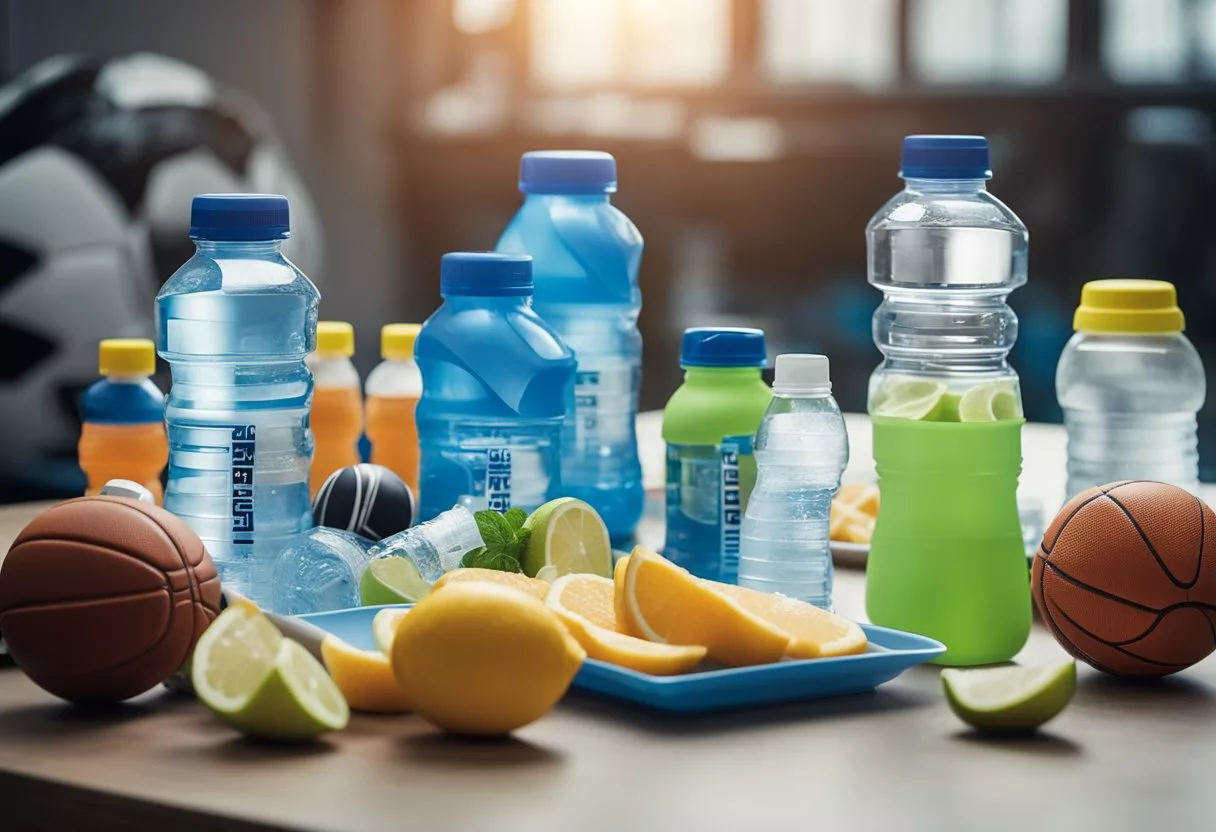
Electrolyte drinks come in various types, including ready-to-drink solutions, powders to be mixed with water, and even effervescent tablets. They are often fortified with carbohydrates for providing energy during prolonged physical activities.
The nutritional composition of these drinks can vary, and understanding what product works best for your exercise routine means considering the intensity of your workouts, the duration of your activities, and your overall dietary needs.
Additionally, while there are numerous benefits to using electrolyte drinks in a fitness context, it’s essential to be aware of potential drawbacks, such as excess sugar content or calories, and to use these drinks judiciously.
Key Takeaways
- Electrolyte drinks replenish fluids and essential minerals lost during physical activities, aiding in performance and recovery.
- There is a diverse range of electrolyte drink products available to suit different exercise needs and preferences.
- It is important to balance the benefits of electrolyte drinks with their nutritional content and to use them as part of an overall fitness strategy.
The Role of Electrolytes in Exercise
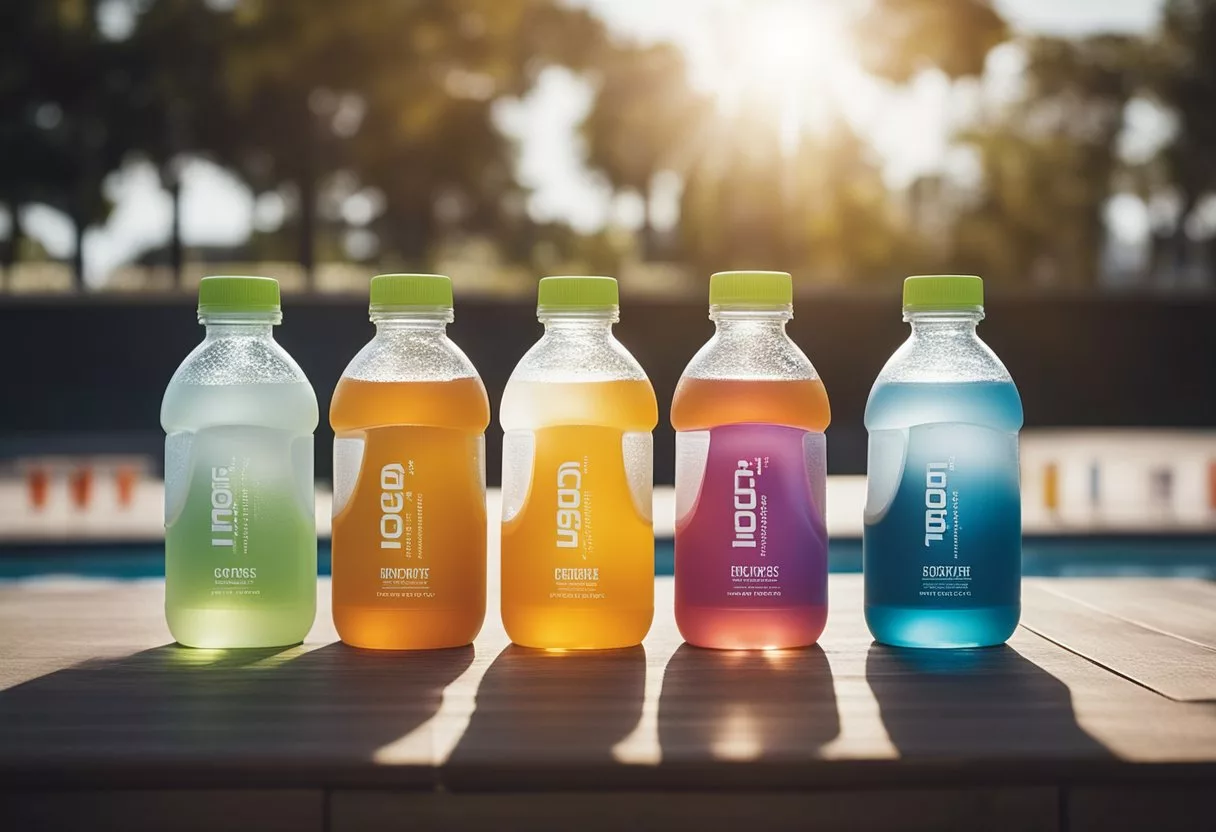
Electrolytes are minerals essential for numerous physiological functions, especially in the context of exercise where they play a critical role in hydration and muscle function. Maintaining electrolyte balance is pivotal for optimal physical performance and recovery.
Understanding Electrolytes and Their Functions
Electrolytes, including sodium, potassium, magnesium, calcium, and chloride, are charged particles that help regulate fluid balance, muscle contractions, and nerve signals.
For instance, sodium assists in fluid retention and is crucial for muscle function, while potassium helps regulate heartbeat and muscle contractions. Meanwhile, magnesium contributes to energy production and muscle relaxation, calcium is vital for muscle contractions and bone strength, and chloride helps maintain proper blood volume and pressure.
Importance of Hydration and Electrolyte Balance
During exercise, the body loses water and electrolytes through sweat, with sodium being the most significantly excreted mineral.
Adequate hydration with fluids containing electrolytes is necessary to maintain balance and performance. Proper electrolyte levels help to avoid dehydration, sustain energy levels, and prevent muscle cramps. They are essential for rapid recovery post-exercise, facilitating swift restoration of the body’s fluid and electrolyte levels.
Consequences of Electrolyte Imbalance
An imbalance in electrolytes can seriously impair athletic performance and can lead to conditions such as hyponatremia, caused by low sodium levels, or hyperkalemia, due to high potassium.
Symptoms of an imbalance may include fatigue, confusion, muscle cramps, and irregular heart rhythms. Severe cases can be life-threatening, underscoring the need for maintaining a proper electrolyte balance through food, beverages, or supplements, especially during prolonged periods of physical activity.
Types of Electrolyte Drinks

Electrolyte drinks are vital for athletes and fitness enthusiasts to maintain hydration and replenish essential minerals. These drinks come in different forms to suit various needs and preferences.
Sports Drinks Vs. Natural Alternatives
Sports drinks are commercially available beverages designed specifically for athletes to quickly replace electrolytes lost during intense activities. They typically contain a blend of sodium, potassium, and carbohydrates to aid in rehydration and energy supply.
Popular brands include Gatorade and Powerade, which are known for their wide range of flavors and ease of access.
In contrast, natural alternatives like coconut water are gaining popularity as they offer a more organic way to replenish electrolytes.
Coconut water is naturally rich in potassium and contains other minerals like magnesium and calcium. It is a good choice for those looking for a less processed option with fewer additives.
Electrolyte Powders and Tablets
Electrolyte powders and tablets are concentrated forms of electrolytes that can be added to water. They are portable and easy to customize based on personal hydration needs.
These products often have the advantage of lower sugar content compared to traditional sports drinks. They can be found in options that cater to high-intensity exercise, as listed in top electrolyte hydration packets.
Electrolyte Water and Enhanced Fluids
Enhanced fluids such as electrolyte water are a subtler alternative that can be consumed throughout the day, not just during exercise.
This category includes water with added electrolytes for taste and hydration benefits without the extra calories or sugar. Electrolyte-enhanced waters can provide the necessary ions like sodium and potassium for adequate rehydration.
Nutritional Composition of Electrolyte Drinks
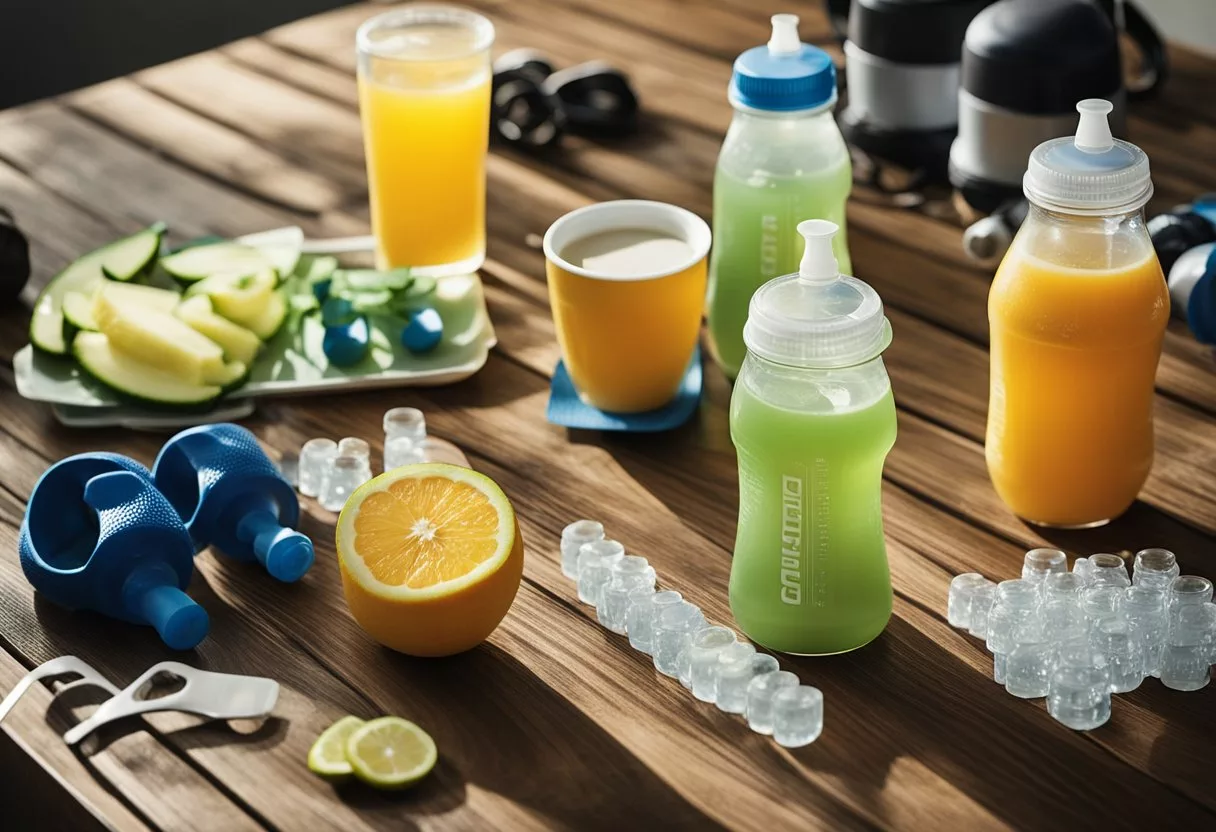
Electrolyte drinks are specifically designed to support hydration and energy needs during physical activity. They typically include a blend of sugars, carbohydrates, vitamins, and minerals tailored to replenish the body’s lost stores during exercise.
Sugars and Carbohydrates Content
Electrolyte drinks often contain sugars and carbohydrates to help athletes maintain energy levels during prolonged exercise.
For instance, a typical sports drink may include glucose, fructose, or a mixture of complex carbohydrates that provide a quick and sustained energy source.
- Types of Sugars:
- Glucose
- Fructose
- Carbohydrate Range:
- Varies, could be from 14g to 25g per 8 oz
Artificial Sweeteners and Additives
Many electrolyte drinks incorporate artificial sweeteners for those who seek low-calorie options.
These can include sucralose, aspartame, or acesulfame potassium, which provide a sweet taste without the added calories that sugars carry.
- Common Artificial Sweeteners:
- Sucralose
- Aspartame
- Acesulfame potassium
- Possible Additives:
- Preservatives
- Flavor enhancers
Protein, Vitamins, and Minerals
While not all electrolyte drinks contain protein, some might include it to aid in muscle recovery post-exercise.
Vitamins like B vitamins, and minerals such as zinc and phosphorus, are added to support metabolic processes. The presence of antioxidants and essential minerals like sodium and potassium helps protect against oxidative stress and restores electrolyte balance.
- Typical Vitamins and Minerals:
- Sodium
- Potassium
- Calcium
- Magnesium
- B Vitamins
- Vitamin C (as an antioxidant)
- Zinc
- Phosphorus
- Protein Content: Typically negligible or absent
Benefits of Electrolyte Drinks in Sports and Fitness
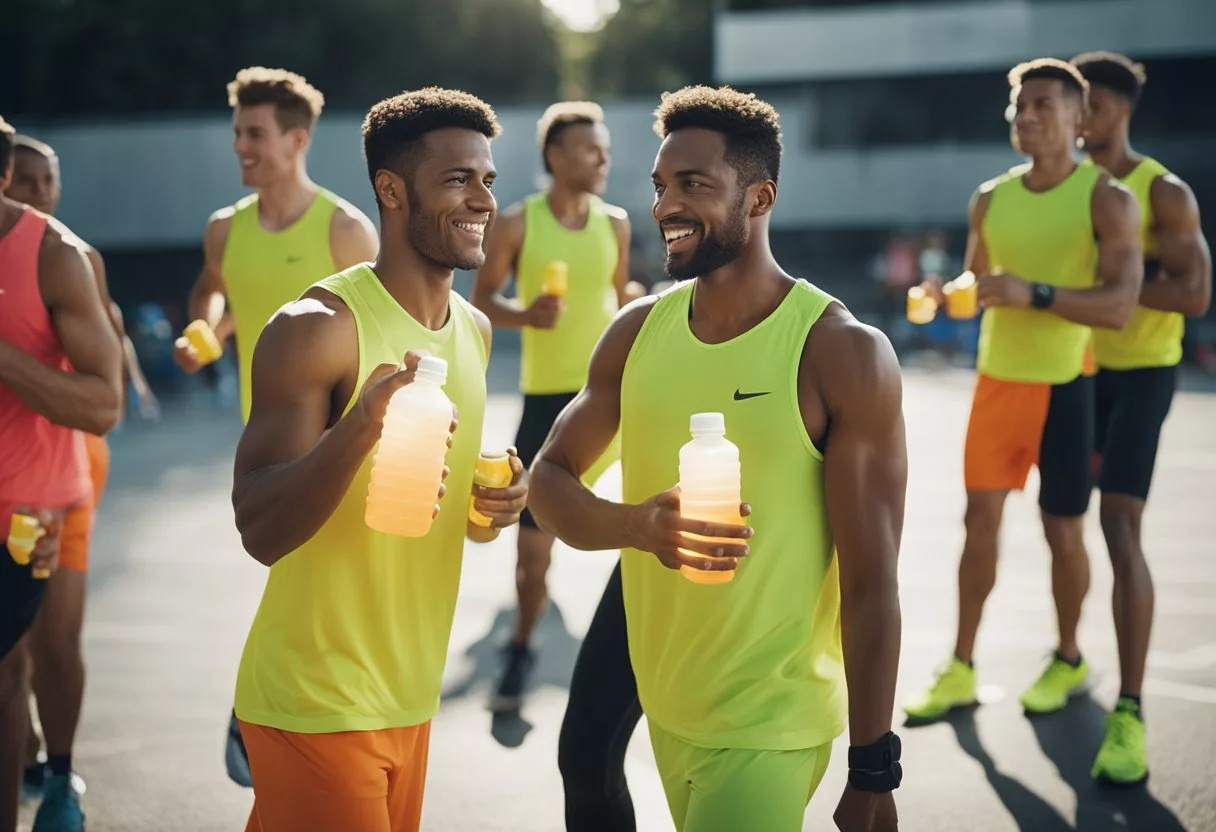
Electrolyte drinks are designed to replenish minerals lost during intense exercise, aiding in maintaining optimal function for sports and fitness activities.
Enhancing Athletic Performance
When athletes engage in rigorous physical activity, their bodies lose electrolytes through sweat.
Replacing these lost electrolytes is crucial to maintain endurance and performance levels. Electrolyte drinks help in maintaining the balance of essential minerals like sodium, potassium, and magnesium, which are pivotal for nerve function and muscle contraction.
Studies have shown that these drinks can help sustain energy levels and prevent the decline in performance associated with dehydration and electrolyte imbalance.
Supporting Workout Recovery
After intense exercise, the body needs to recover. Electrolyte drinks provide the hydration necessary for recovery. They also contain carbohydrates that aid in replenishing glycogen stores.
This is essential as glycogen is the primary fuel used by muscles during prolonged physical activity. Quick restoration of glycogen and electrolytes accelerates the recovery process, helping to reduce muscle soreness and fatigue. For athletes, this means they can return to training sooner and maintain a high level of performance across successive workouts or competitive events.
Practical Considerations and Usage

Electrolyte drinks are a strategic component in maintaining hydration and replenishing essential minerals during intense physical activities. Understanding when to use them, recommended daily intakes, and how to choose the right one is critical for athletes and individuals who engage in regular exercise.
When to Use Electrolyte Drinks
Electrolyte drinks are most beneficial during prolonged physical activities where significant sweating occurs, typically lasting longer than an hour. They serve to replace lost minerals, particularly sodium and potassium, which are crucial in preventing dehydration and muscle cramps.
Athletes should also consider environmental factors such as high temperatures or humidity. These conditions increase fluid loss and the need for electrolyte replenishment.
Daily Intake Recommendations
Consulting a healthcare professional can provide personalized advice on the consumption of electrolyte drinks as part of an individual’s nutrition and diet.
In general, it is recommended to consume these drinks according to hydration needs rather than a fixed daily amount. For example, consuming 7-10 ounces of fluid every 10-20 minutes during exercise is a common guideline.
Post-exercise, guidelines suggest rehydrating with 16-24 ounces of fluid for every pound lost to effectively combat dehydration.
Selecting the Right Electrolyte Drink
When choosing an electrolyte drink, it is important to look at the nutritional label and ingredient list.
A suitable electrolyte drink should contain a balance of sodium, potassium, chloride, calcium, and magnesium. Be cautious of high sugar content and artificial sweeteners, as they may not be necessary for everyone’s diet.
Individuals should select a drink that aligns with their specific hydration needs, activity level, and any health-related concerns, such as restricting sodium intake due to hypertension.
Options like electrolyte powders can also provide flexibility in managing daily recommendations for electrolyte and fluid intake.
Potential Drawbacks and Precautions
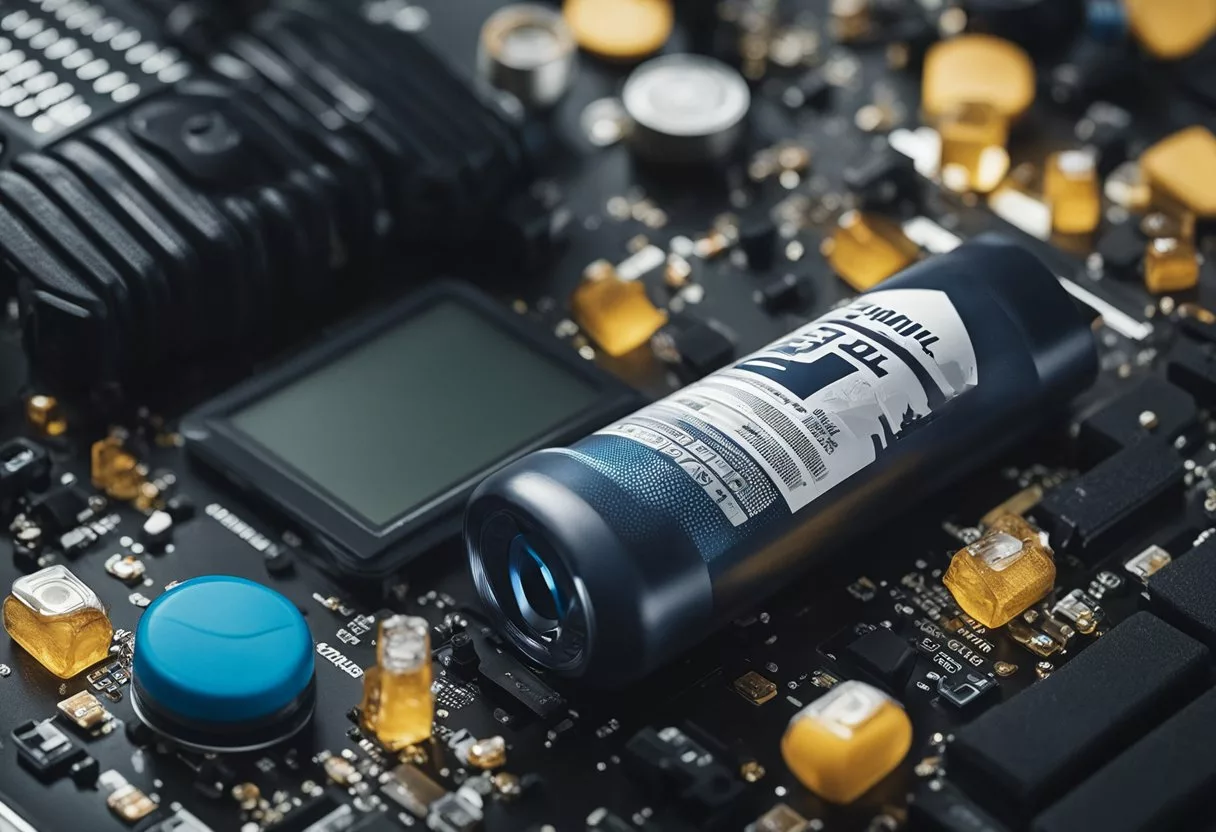
While electrolyte drinks can be beneficial for hydration and nutrient replenishment during intensive exercise, it is essential to be aware of potential drawbacks and the need for precautions. Overconsumption or misuse may lead to adverse health effects.
Side Effects of Overconsumption
Excessive intake of electrolyte drinks can result in an electrolyte imbalance, which may cause symptoms such as headaches, nausea, vomiting, and diarrhea.
These symptoms are indicative of fluid loss and an imbalance in lost electrolytes, often requiring consultation with a healthcare professional. It is crucial for individuals to adhere to recommended quantities to avoid the risk of these side effects.
Interactions with Health Conditions
People with certain health conditions need to exercise caution with electrolyte drinks.
For instance, those with kidney issues may be at risk of elevated blood levels of potassium or sodium, leading to further complications.
It is vital for such individuals to consult healthcare professionals before consuming these drinks to prevent any adverse interactions with their health condition.
Emerging Trends and Research
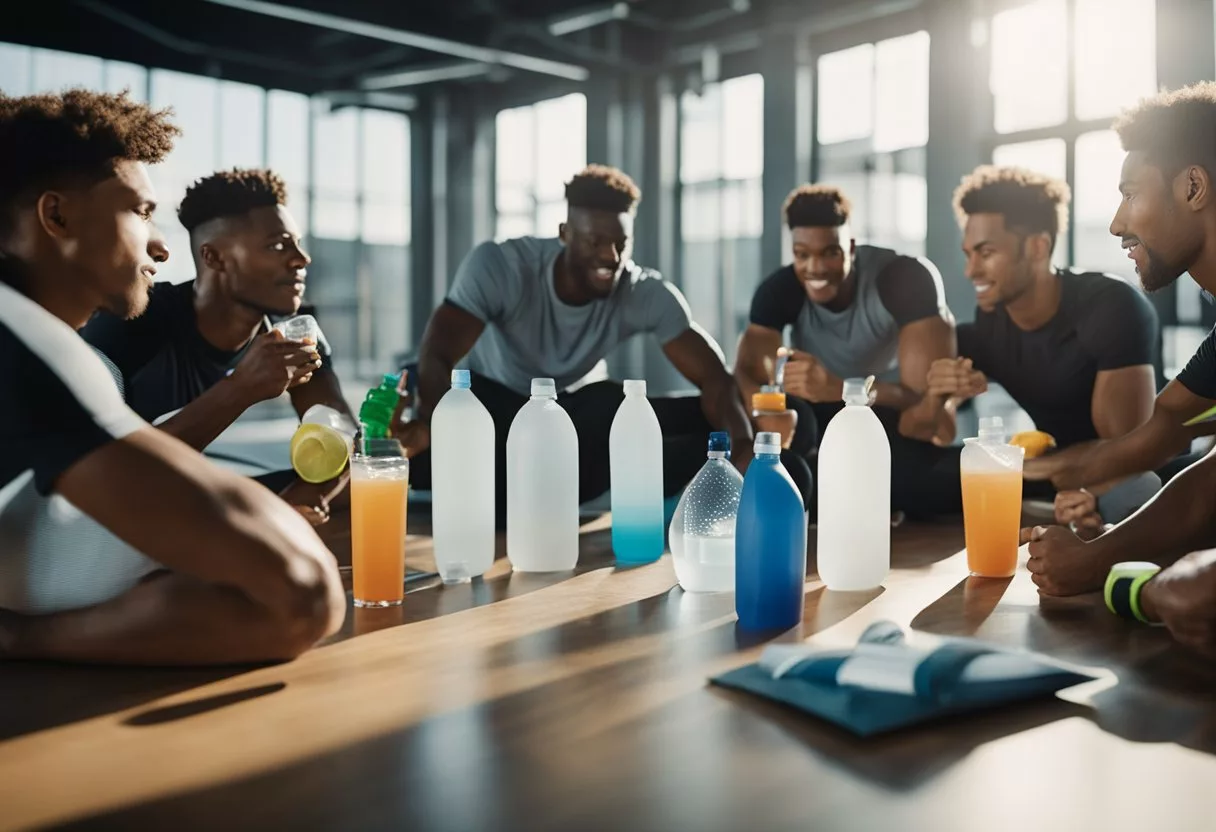
The landscape of electrolyte drinks is constantly evolving, propelled by new research and innovations in drink formulation that aim to enhance athlete performance and recovery. The focus on natural ingredients and quality of production is reshaping the marketplace for these popular sports supplements.
Innovations in Electrolyte Drink Formulation
The formulation of electrolyte drinks is seeing a trend towards incorporating natural flavors and quality ingredients to improve taste without compromising the nutritional value.
Enhanced with natural sweeteners and colorants, the modern electrolyte drink offers a more palatable experience, often without the unwelcome aftertaste associated with artificial additives.
Many brands are now emphasizing third-party testing to validate the purity and efficacy of their ingredients, reassuring consumers about the safety and reliability of their products.
Scientific Studies on Hydration and Recovery
Recent studies underscore the importance of hydration and the role of electrolyte drinks in effective recovery post-exercise.
In line with recommendations from the American College of Sports Medicine, research indicates that an optimal range of 4-8% carbohydrates in electrolyte drinks can be crucial for replenishing energy stores.
Moreover, current research suggests that the inclusion of electrolyte supplements can significantly aid in maintaining balance and preventing dehydration during extended periods of physical activity. This is seen as a key component in optimizing athletic performance and expediting recovery processes.
Consumer Information
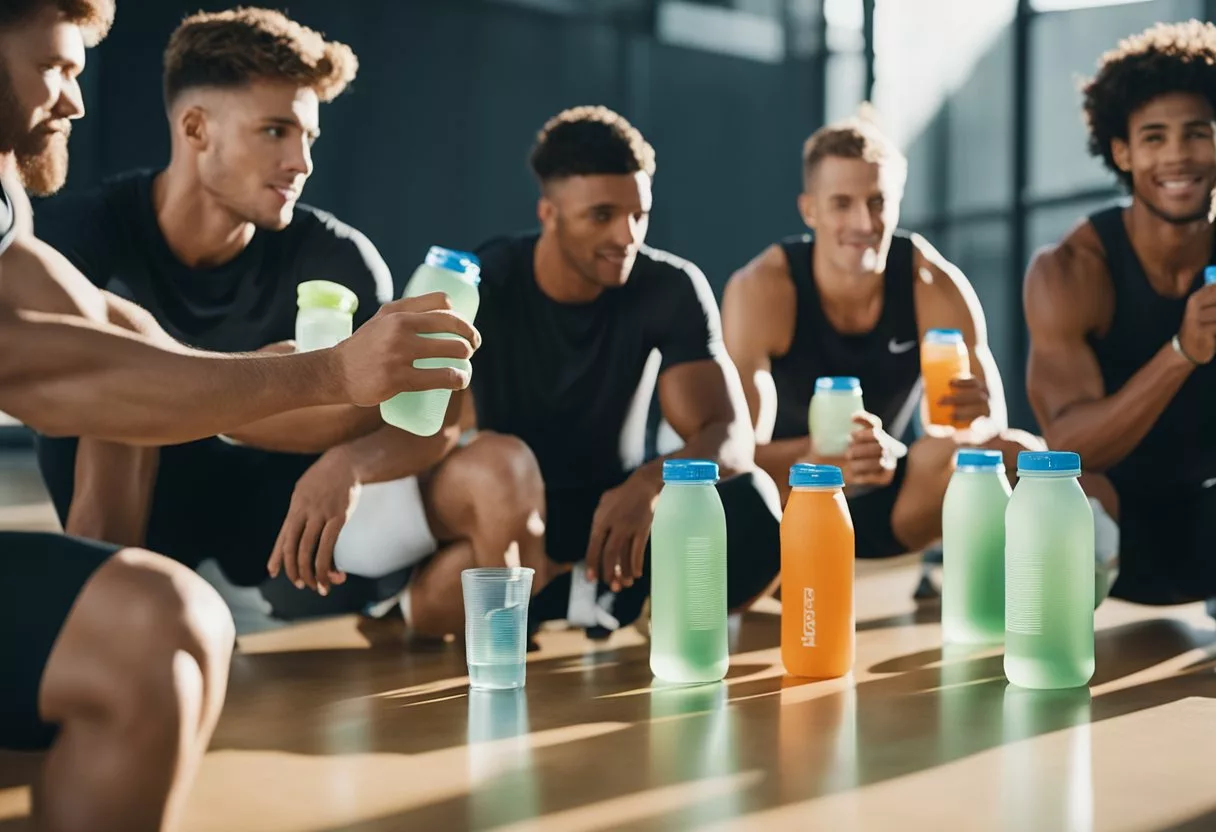
When selecting electrolyte drinks for sports and exercise, understanding label information and comparing different brands is crucial for making an informed choice.
Reading Labels and Understanding Claims
Electrolyte drinks can vary significantly in their composition. It is important to read labels carefully to assess artificial flavors and added sugar content.
For health-conscious consumers, identifying sugar-free options or those sweetened with natural alternatives like stevia or sucralose is key.
Quality of ingredients should be scrutinized, with a preference for products that are third-party tested to ensure that the claims on the label match what’s inside the bottle.
- Artificial Flavors: Be aware if you prefer natural over synthetic tastes.
- Added Sugar: Consider the amount and type of sugar used.
- Sugar-Free: Look for this label if you’re avoiding sugar altogether.
- Stevia/Sucralose: These may be present as sugar alternatives.
- Third-Party Tested: Verifies brand claims for ingredient purity and content.
Comparing Brands and Value
Brand comparison is essential for determining the value of an electrolyte drink.
Not all brands are created equal, and while some may offer a lower price point, they might compensate by using lower quality ingredients or higher amounts of additives.
- Brand: Research brand reputation and consumer reviews.
- Value: Consider cost per serving and not just the upfront price.
- Quality: A higher price might reflect better-quality ingredients.
Best Electrolyte Drinks for Runners
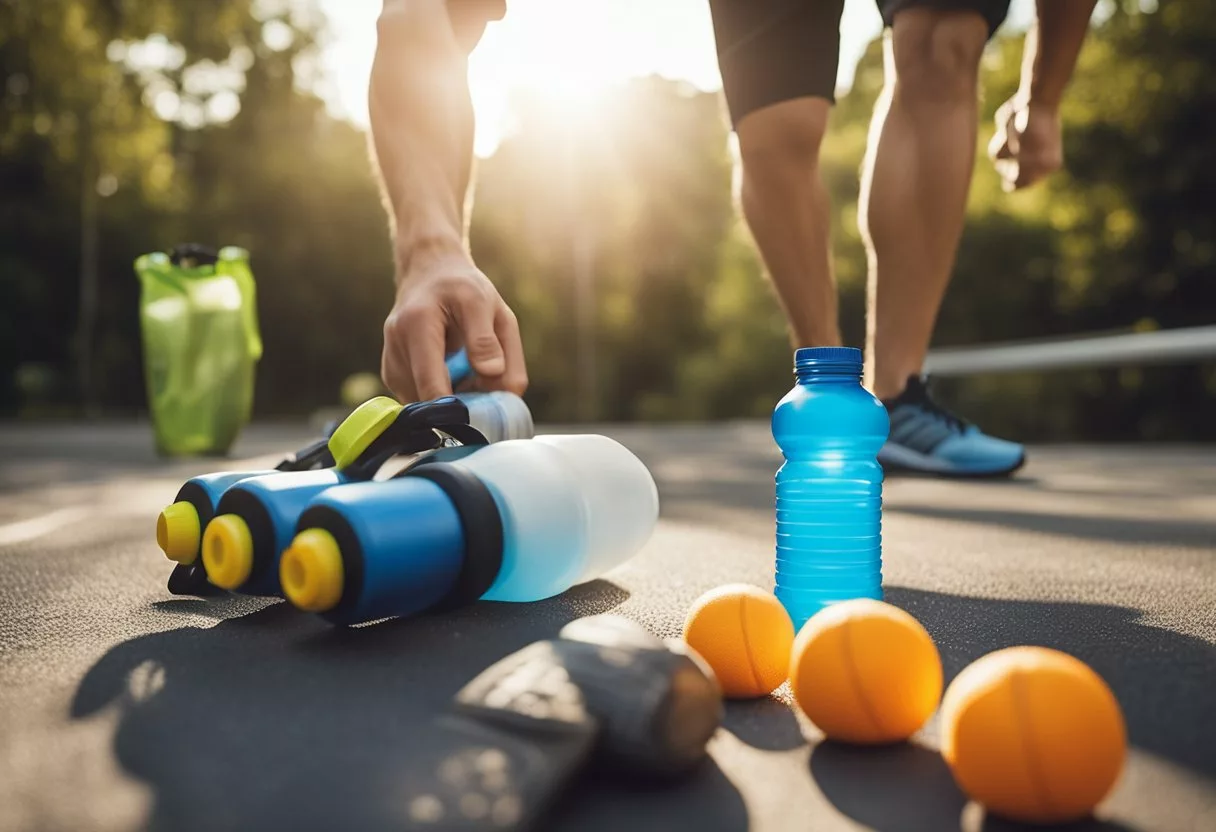
When considering electrolyte drinks for runners, it’s essential to focus on products designed to replenish minerals lost through sweat during intense activity. Runners need a balanced mix of sodium, potassium, calcium, and magnesium for optimal performance and recovery.
- Skratch Labs Sport Hydration Drink Mix: This drink mix is praised for its balance of essential electrolytes and for using real, recognizable ingredients. It’s specifically crafted to match what is lost when runners sweat.
- Nuun Sport Hydration Tablets: A convenient option for runners on the go, Nuun tablets dissolve in water to create a drink packed with electrolytes and clean ingredients. They also have the added benefit of being low in calories and sugars.
- Gatorade Endurance Formula: A new formula from a well-known brand in sports nutrition, it’s tailored for endurance sports, offering higher levels of sodium and potassium to support long-distance runners.
| Brand | Sodium | Potassium | Calcium | Magnesium | Calories |
|---|---|---|---|---|---|
| Skratch Labs | High | Moderate | Moderate | Moderate | Low |
| Nuun Sport | Moderate | Moderate | Low | Low | Very Low |
| Gatorade Endurance | High | High | Moderate | Low | Moderate |
Runners should consider their personal sweat rate and electrolyte loss variability.
Those who sweat more or have higher sodium content might prefer drinks with higher sodium concentration like Gatorade Endurance. Lighter sweaters or those looking for a low-calorie option might lean towards Nuun.
When selecting the best electrolyte drink, runners should not only consider their specific electrolyte needs but also the taste and the ingredients list of the product to ensure it aligns with their health and dietary preferences.
Options like the best electrolyte tablets or tailored hydration drink mixes provide a variety of choices for every runner’s individual needs.
Best Electrolyte Drinks for Athletes
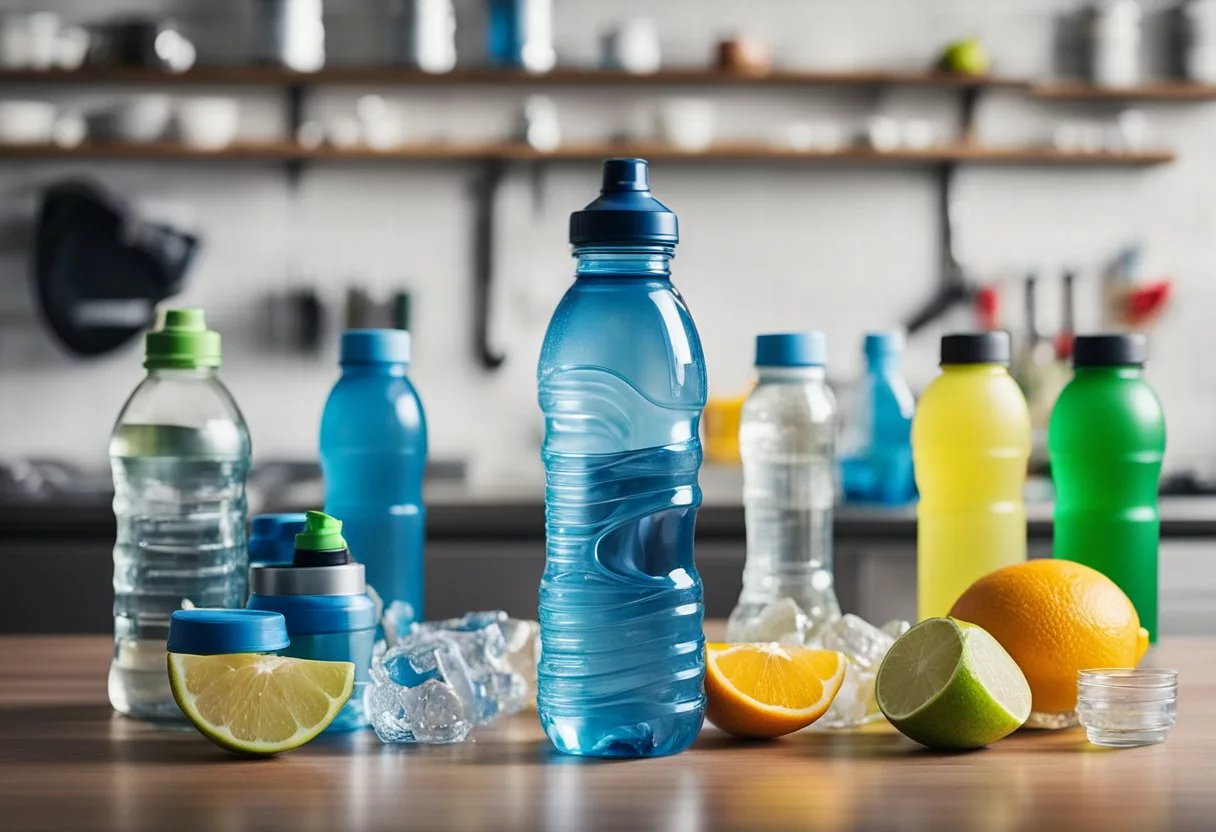
Electrolyte drinks are crucial for athletes to maintain optimal hydration and replace minerals lost through sweat during intense workouts. They look for drinks that offer a perfect balance of electrolytes, taste, and effectiveness.
- Transparent Labs Hydrate V3: Praised for its comprehensive electrolyte profile, Transparent Labs Hydrate is the preferred choice for athletes looking to maintain peak performance. Each serving offers a significant dose of electrolytes without added sugars.
- XWERKS Motion: This is an excellent option specifically for runners. It provides a tailored blend of electrolytes and easily digestible carbohydrates for sustained energy during long-distance events.
- Liquid I.V. Hydration Multiplier Single Serving Packets: Convenient for travel, these single-serve packets can easily transform regular water into a powerful electrolyte drink, perfect for athletes on the go.
- Sports Research Electrolytes: A favorite among athletes, this brand offers a balanced mix of electrolytes and is especially noted for serving ketogenic-friendly and sugar-free options.
For Everyday Use:
- Buoy Electrolyte Drops: Simply added to water, these drops are a subtle yet effective way for athletes to stay hydrated on a routine basis. They provide a concentrated dose of electrolytes with minimal taste.
High-Intensity Exercise:
- Skratch Labs Sport Hydration Drink Mix: Ideal for athletes engaged in high-intensity exercise, this mix helps to replenish electrolytes swiftly and efficiently.
Caffeinated Option:
- Tailwind Nutrition Caffeinated Endurance Fuel: Caffeine can give athletes an extra boost, and Tailwind combines that with a solid electrolyte profile for extended endurance activities.
Best Electrolyte Drinks for Cyclists
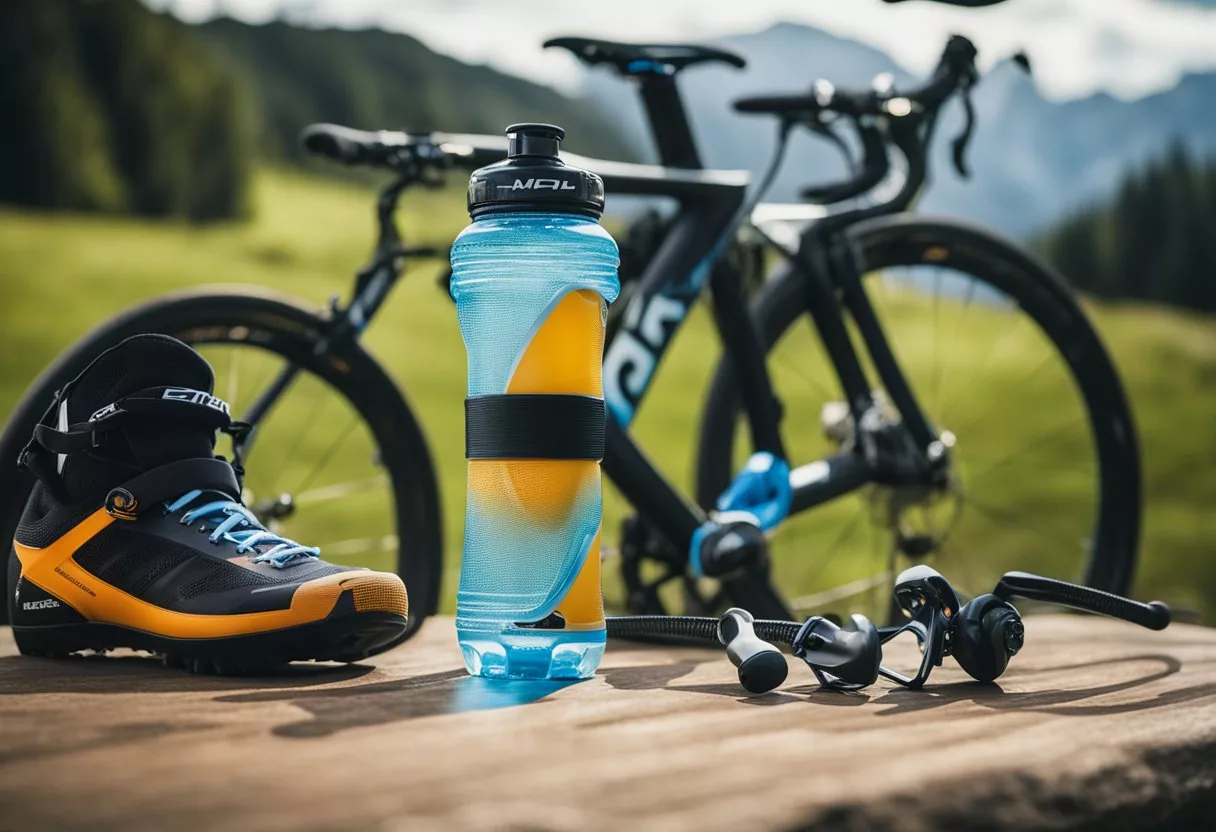
When cyclists seek to maintain their performance and endurance, they often rely on electrolyte drinks to stay hydrated. The market offers various options, each with different formulations to cater to specific dietary preferences and performance needs.
- SiS GO: Known for its robust flavor profile and longevity in the market, SiS GO is a “classic energy drink” for cyclists. It provides carbohydrates at a competitive cost per gram, suitable for those long rides when energy expenditure is at its peak. Its strong flavors are popular among those who prefer a more intense taste. (Cycling Weekly)
- Torq Energy: Part of a four-part fueling system, Torq Energy offers a powder mix with 30 grams of carbohydrates. Designed to work in conjunction with the brand’s other products—gels, chews, and bars—it ensures consistent energy supply. (Cycling News)
- CLIF Hydration Electrolyte Drink Mix: This mix is tailored for cyclists, presenting three distinct formulas. They’re applicable for pre-event hyper-hydration, during-exercise replenishment, and general rehydration. It’s particularly suitable for those who appreciate a mix of versatility in its usage. (Coach Levi)
Frequently Asked Questions

In navigating the options for hydration and recovery, understanding electrolytes and sports drinks is essential. This section answers common queries regarding the natural sources, performance benefits, and healthier options for electrolyte drinks.
What are the best natural options for electrolyte replenishment during exercise?
Natural options for electrolyte replenishment during exercise include coconut water, which is a good source of potassium and sodium, and watermelon juice, known for its hydrating properties and electrolyte content.
How do electrolyte drinks enhance athletic performance and recovery?
Electrolyte drinks support athletic performance by maintaining the balance of essential minerals in the body, which are critical for nerve function and muscle contraction. Post-exercise, these drinks aid in replenishing electrolytes lost through sweat, thereby aiding in a quicker recovery.
What distinguishes healthy sports drinks with electrolytes from regular sports drinks?
Healthy sports drinks with electrolytes typically contain lower sugar content and more natural ingredients. They focus on providing a balanced mix of electrolytes like sodium and potassium without the added artificial colors or flavors commonly found in regular sports drinks.
Which sports drink provides the most effective hydration for athletes?
The most effective hydration for athletes comes from sports drinks that have a balance of electrolytes, carbohydrates, and fluids tailored to the intensity of exercise and individual needs. An example includes products with added electrolytes and minerals specifically designed for hydration.
How can I tell if I need to consume electrolytes during my workout?
Signals that indicate a need for electrolyte consumption during a workout include muscle cramps, fatigue, dizziness, and excessive sweating. These symptoms suggest that the body has lost essential minerals that need to be replaced for continued physical performance.
What are the key benefits of using electrolyte drinks when feeling unwell?
Electrolyte drinks can restore mineral balance, prevent dehydration, and help maintain proper bodily function. They are especially useful for conditions like the flu or diarrhea that lead to fluid loss.